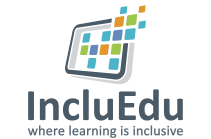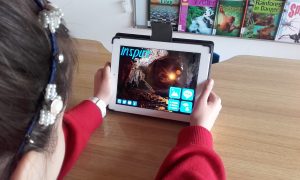WHAT DID YOU DO?
Social Literacy Skills - improve children’s ability to respond using different forms of social language and by using IT methods.
We put children in pairs and select one child as the shop manager and other child as the customer. They would build up a correspondence over several sessions using iPad where they continue to communicate to each via using email communication, until a resolution is found. Appropriate social language would have to be pre-taught and assistance would be needed to guide the students as how to find a possible solution/problem solving.
Read more
Social Literacy Skills - improve children’s ability to respond using different forms of social language and by using IT methods.
We put children in pairs and select one child as the shop manager and other child as the customer. They would build up a correspondence over several sessions using iPad where they continue to communicate to each via using email communication, until a resolution is found. Appropriate social language would have to be pre-taught and assistance would be needed to guide the students as how to find a possible solution/problem solving.
Read less
HOW DID YOU DO IT?
Discussion: what types of issues do customers complain about? • Recall a time when you had to complain • Create list of typical issues • Classify complaints into categories • Discussion: how would you go about making a complaint?
What are the different ways?
Teacher model: Draft short email to make complaint about small issue • Students then draft their own email
Did you encounter problems when applying your pedagogical idea?
Diverse range of issues students wanted to focus one, could not agree on one topic.
Various levels of ability, some finishing faster than others.
How did you solve them? • Created list on board of all the issues mentioned. • I (teacher) chose one to model to students, however they were then free to select their own issue they wanted to draft an email about. • For students finished early, they then selected a second issue from list created on board and began drafting a second email of complaint. • If two students were both finished, I got them to send the email to each other and decide how to respond appropriately as the manager of the relevant organization.
What were the most beneficial features of tablets? • The children really enjoy using them are thus enthusiastic about the lesson. • There is predictive text option available which is a great aid for children with spelling and literacy difficulties. • The child get a strong sense of self achievement • Children who have dysgraphia or any spelling difficulties are more willing to write/type their words as their handwriting is not being questioned or evaluated. They are more confident to type than write. • Much easier to save and access work previously worked on. • Much easier to edit written work
Read more
Discussion: what types of issues do customers complain about? • Recall a time when you had to complain • Create list of typical issues • Classify complaints into categories • Discussion: how would you go about making a complaint?
What are the different ways?
Teacher model: Draft short email to make complaint about small issue • Students then draft their own email
Did you encounter problems when applying your pedagogical idea?
Diverse range of issues students wanted to focus one, could not agree on one topic.
Various levels of ability, some finishing faster than others.
How did you solve them? • Created list on board of all the issues mentioned. • I (teacher) chose one to model to students, however they were then free to select their own issue they wanted to draft an email about. • For students finished early, they then selected a second issue from list created on board and began drafting a second email of complaint. • If two students were both finished, I got them to send the email to each other and decide how to respond appropriately as the manager of the relevant organization.
What were the most beneficial features of tablets? • The children really enjoy using them are thus enthusiastic about the lesson. • There is predictive text option available which is a great aid for children with spelling and literacy difficulties. • The child get a strong sense of self achievement • Children who have dysgraphia or any spelling difficulties are more willing to write/type their words as their handwriting is not being questioned or evaluated. They are more confident to type than write. • Much easier to save and access work previously worked on. • Much easier to edit written work
Read less
WHY WERE TABLETS USED/WAS IT BENEFICIAL?
Tablets were used as there is two children in this learning support group with specific literacy difficulties. These students are often very reluctant to write as they have self-conscious and are consumed with their errors in their work. For this reason I chose the tablets as they are very useful to empower these children and leave them with a greater sense of achievement in their completed work.
What did the learners gain by using tablets? • Satisfaction and achievement from completing Draft complaint email • Identify errors and self-correct using correction features • A sense of Independence working alone, without relying on teacher for assistance • Sequence skills using tablets to carry out task. • Self-confidence- ability to transfer some of skills to written work
What made the methods you used successful? The fact that the children have a very positive attitude towards IPads is a big plus. It means that the children are enthusiastic about the lesson before they even find out what the content is. As mentioned previously, tablets are also very useful for children who are reluctant to write due to literacy difficulties. It is much easier to encourage them to complete forms of written work when they are using an IPad as they are much less self-conscious.
Read more
Tablets were used as there is two children in this learning support group with specific literacy difficulties. These students are often very reluctant to write as they have self-conscious and are consumed with their errors in their work. For this reason I chose the tablets as they are very useful to empower these children and leave them with a greater sense of achievement in their completed work.
What did the learners gain by using tablets? • Satisfaction and achievement from completing Draft complaint email • Identify errors and self-correct using correction features • A sense of Independence working alone, without relying on teacher for assistance • Sequence skills using tablets to carry out task. • Self-confidence- ability to transfer some of skills to written work
What made the methods you used successful? The fact that the children have a very positive attitude towards IPads is a big plus. It means that the children are enthusiastic about the lesson before they even find out what the content is. As mentioned previously, tablets are also very useful for children who are reluctant to write due to literacy difficulties. It is much easier to encourage them to complete forms of written work when they are using an IPad as they are much less self-conscious.
Read less
HOW DID IT SUPPORT INCLUSIVE TEACHING?
Children can work at their own pace and level, and it is not as obvious to the other students. Children with literacy difficulties such as dyslexia and dysgraphia are more included in the lesson and their learning needs are more assisted using tablet over handwritten, due to typing features, predictive text and apps for spelling.
Children are not as self-conscious about their work and thus it is more appealing to all students, regardless of their needs.
Read more
Children can work at their own pace and level, and it is not as obvious to the other students. Children with literacy difficulties such as dyslexia and dysgraphia are more included in the lesson and their learning needs are more assisted using tablet over handwritten, due to typing features, predictive text and apps for spelling.
Children are not as self-conscious about their work and thus it is more appealing to all students, regardless of their needs.
Read less




